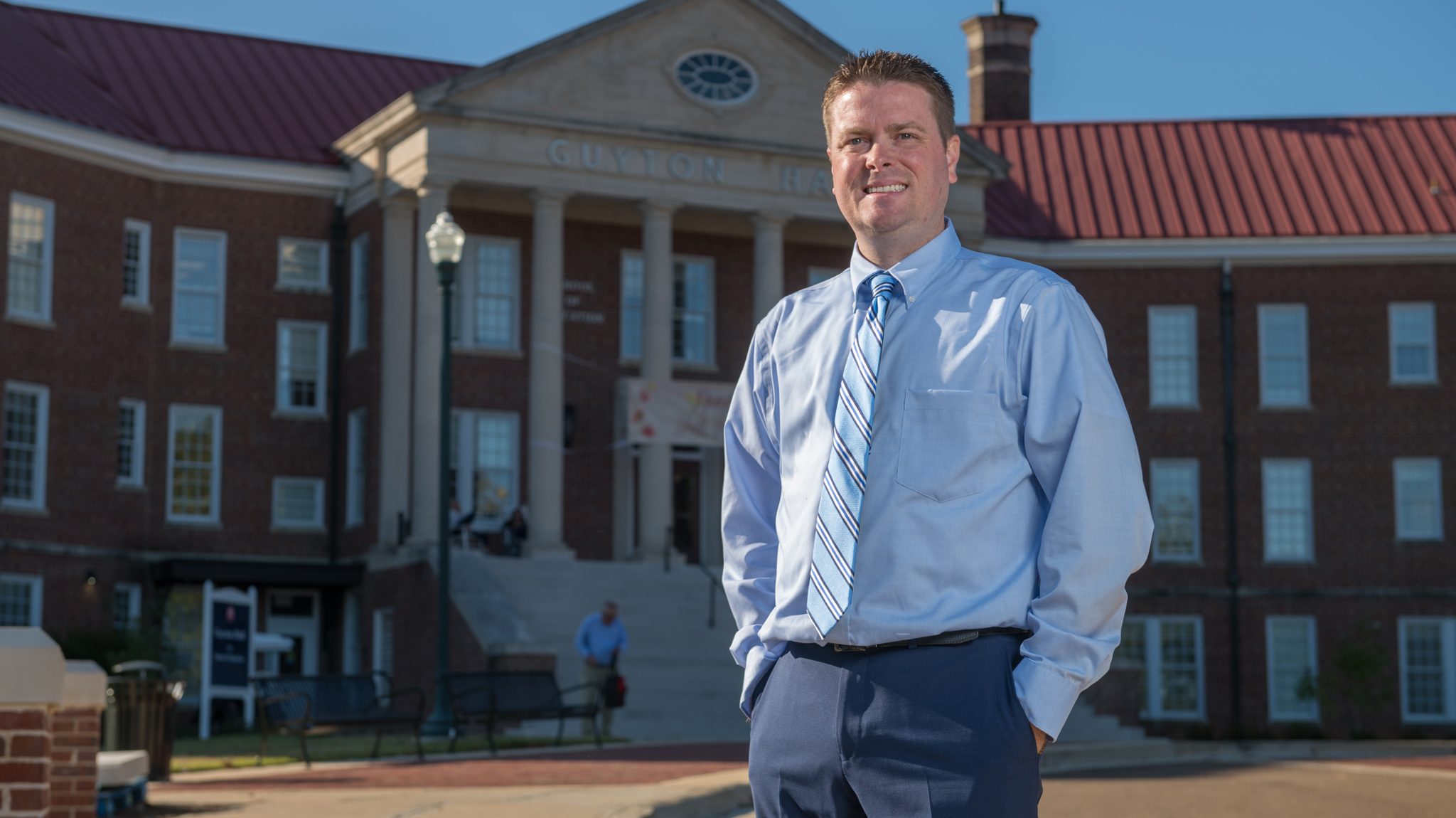
Kris Colvin, a senior special education major at UM, is helping create more learning opportunities about American Sign Language for faculty and staff at the School of Education. Photo by Kevin Bain/Ole Miss Digital Imaging Services
OXFORD, Miss. – Kris Colvin didn’t always believe he could be a teacher. In fact, he remembers being shocked when a substitute teacher in grade school was deaf, too. Colvin was about 10 years old and had never met a teacher who was deaf before.
“Up until then, I was only taught by teachers that could hear, and I was kind of frustrated,” said Colvin, an Olive Branch native. “I thought deaf people couldn’t be teachers.”
Deaf since he was 6 months old, Colvin is a special education major at the University of Mississippi. He credits his grade school substitute, Dinah Estes, with inspiring him to pursue a career in education.
“It was the first time I had ever been taught by a deaf teacher, and I was curious about that,” he recalled. “I started asking her a lot of questions like, ‘Deaf people can be teachers?’ And she said, ‘Yes, deaf people can do anything.'”
With the support of an interpreter, Colvin completes coursework at Ole Miss and classroom observations in local schools. This semester, Colvin is observing in classrooms at Della Davidson Elementary School with plans to be a full-time student teacher in the spring. He is on track to graduate in May.
“Next semester, I’m hoping to be placed in a classroom with all deaf or (hard of hearing) students with an (American Sign Language) teacher, who could be either a hearing or deaf teacher,” Colvin said. “I’m both excited and nervous to start student teaching, but I look forward to learning from my clinical instructor and preparing myself as a well-rounded educator.”
When asked about his favorite class at the School of Education, Colvin laughed and said, “Hold on, let me try to eliminate a few,” finally deciding on Classroom and Behavior Management, taught by Denise A. Soares.
Soares, an associate professor of special education who specializes in behavior disorders, first met Colvin in 2018 when he enrolled in her class.
“I knew his existence in my class that semester was going to be invaluable,” Soares said. “His interpreter sat in the front of the room, and the students quickly adapted and learned from both Kris and the interpreter.
“Kris showed the other students that deaf people can achieve academically, and they have unlimited amounts of potential, just like students who can hear.”
The UM Office of Student Disability Services provides sign language interpreting to students who request the accommodation for their needs. Those needs are not limited to classes, but also include student involvement within the university, such as student organizations and honor societies.
“Here at the university, I not only get to interpret, but I also get to work with students with different disabilities and their needs at school,” said Summer Chappell, access services coordinator and interpreter for student disability services.
“I love being a sign language interpreter and providing communication for all parties in so many situations. Interpreters have the honor of being a part of people’s lives when an outsider would not usually be involved.”
Colvin originally applied to the university in 2016 because of the interpreting services that were available here, and stayed because of his love for learning and the special education program.
“I feel like I’ve been very blessed to be a part of the SPED program,” Colvin said. “It has been amazing, and I really want to encourage other students to come and choose this program at Ole Miss. It’s a phenomenal place.”
Students who graduate from the university’s undergraduate special education program obtain teaching licensure for grades K-12. The program is committed to providing effective teaching, excellent field supervision and support for aspiring special educators.
“Special education teachers need remarkable qualities to succeed, and Kris possesses those qualities,” Soares said. “He is the utmost professional with high levels of integrity and competence.
“He is collaborative in the learning environment, and he has wonderful communication skills to be able to advocate for himself and his students.”
Faculty such as Soares have inspired Colvin to think outside the box when it comes to his career in education. In fact, Colvin and Soares are working with David Rock, UM education dean, to create more learning opportunities about American Sign Language for faculty and staff at the School of Education.
“I think having a sign language class for faculty is a great idea,” Rock said. “But really having Kris participate and help us understand how we can help other students that are hearing impaired in our classes; that’s actually the home run.“
After graduation, Colvin plans to obtain a master’s degree in American Sign Language education. Then he hopes to come back to Mississippi and teach. But his educational goals don’t stop there; he wants to earn a doctorate in education.
Like his substitute teacher years ago, Colvin hopes to teach and inspire his students to pursue their own paths and passions.
“I chose this major because it fits me as a future educator, and I would like to work one-on-one with any student with disabilities,” Colvin said. “Do not ever let someone or something stop you from doing something great.”